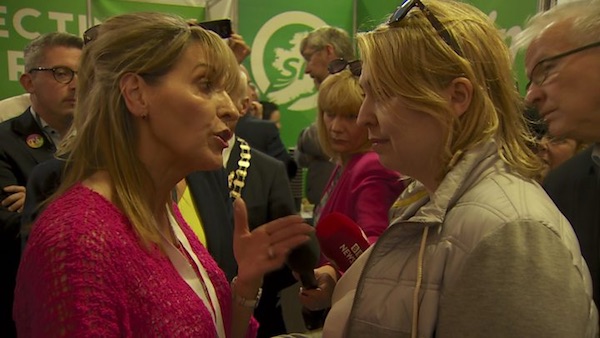
Theresa May has privately ruled out a vote on Irish unity within the north of Ireland because it could produce a majority in favour, according to leaked reports from a secret Tory briefing.
The British Prime Minister clashed with prominent Tory Brexit supporter Jacob Rees-Mogg over plans for the Irish border amid increasingly chaotic discussions among senior Tories.
Rees-Mogg told May he had no doubt the Six Counties of Ireland would remain under British rule after such a vote, known as a border poll. He said Britain would “win” the poll and compared it with the 2015 Scottish independence vote, which unionists won by 55% to 45%.
May reportedly responded: “I would not be as confident as you. That’s not a risk I’m prepared to take. We cannot be confident on the politics of that situation, on how it plays out.”
The prospect of a border poll is a key element of the Good Friday Agreement, which assigns the power to call one exclusively to the British government.
The 1998 peace deal states the British Direct Ruler should call a border poll if “it appears likely... a majority of those voting would express a wish that Northern Ireland should cease to be part of the United Kingdom and form part of a united Ireland”.
It was long believed that slow demographic change meant that a nationalist majority in the north of Ireland was decades away, but Brexit has created a paradigm shift which is now widely recognised. The campaign for reunification has gained momentum since a majority in the Six Counties voted to remain in the European Union, against the mainly English desire to quit the EU.
While the north of Ireland remains uncharted territory for the major opinion polling companies, some surveys and anecdotal evidence have pointed to a Brexit-infused surge in the numbers from both communities and neither willing to embrace the potential for a united Ireland.
With the 100th anniversary of the 1921 partition of Ireland also approaching, there has been growing optimism among nationalists that a Six-County referendum can finally be called. However this strategy hinges on the British government keeping their word, and that now appears to be in doubt.
At an agricultural show this week, Sinn Fein MEP Martina Anderson (pictured, left) publicly confronted the British Direct Ruler Karen Bradley and demanded a border poll.
“There is demonstrable change for a unity poll and your Prime Minister knows it,” she said. “I think the evidence was have raised from opinion polls shouldn’t be dismissed.”
“We are going to write on the points that were raised [by Sinn Fein MPs],” responded Bradley. “We are going to write about it.”
“The Tory position on a border poll is untenable,” Ms Anderson said later.
“Comments attributed to Theresa May that she believes her government would lose a referendum on Irish reunification are an admission the threshold to hold such a vote has now been met.
“The toxic deal between the Tories and the DUP for selfish party political interests is at odds with the rigorous impartiality required of them under the Good Friday Agreement and the British government is facilitating the DUP’s denial of rights and their refusal to restore the political institutions.”
‘FUNDAMENTAL BREACH’
Sinn Fein Deputy Leader Michelle O’Neill also insisted that May has ‘no right’ to deny the people of Ireland the democratic entitlement to decide their own constitutional future.
“That is an appalling display of contempt for the democratic rights of Irish citizens. It is also a fundamental breach of the Good Friday Agreement which clearly provides for a referendum. Theresa May has no right to deny democratic entitlements to the people of Ireland, North and South.”
She said Sinn Fein had raised the need for a unity referendum with the British government on numerous occasions over recent years, particularly in the wake of the Brexit vote.
“On each occasion they have stated that they do not believe the threshold has been met but have repeatedly refused to clarify what criteria they use to reach this conclusion.
“The Good Friday Agreement and the subsequent legislation states that a poll shall be held ‘if at any time it appears likely’ to the British Secretary of State that a majority in the North would vote to form part of a united Ireland.
“There is nothing in that legislation that prevents a referendum from taking place at any stage. However, even if you accept the British government’s interpretation of the threshold, then Theresa May’s comments are an admission that she believes the bar has now been reached.
“However, rather than act on that by honouring her government’s commitments and allowing people to exercise their democratic rights, she has also indicated that she intends to actively prevent that from happening.”
Ms O’Neill said this was “entirely unacceptable”.
“It is an affront to the democratic rights of our people and the British government must immediately clarify their position regarding their commitments to a unity referendum in line with their legislative and Good Friday Agreement commitments.”
Commenting later, a Downing Street spokesman insisted the British government “steadfastly” supported the Good Friday Agreement.
He added: “It remains the Northern Ireland secretary’s view that a majority of people in Northern Ireland continue to support the current political settlement, and that the circumstances requiring a border poll are not satisfied.”
![[Irish Republican News]](https://republican-news.org/graphics/title_gifs/rn.gif)
![[Irish Republican News]](https://republican-news.org/graphics/title_gifs/harp.gif)

